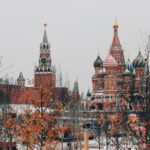A secretive group that appears to be based in Russia has published a comprehensive new report on the country’s state surveillance apparatus, including an assessment of its use of biometrics and facial recognition.

The report, titled “State of Surveillance”, highlights both the legal and practical aspects of the deployments of these biometric technologies. Currently, there are no explicit federal laws regulating the governmental use of facial recognition or establishing a state-wide system. Instead, local authorities, particularly in Moscow, have been using these technologies under broader legal provisions related to counter-terrorism and transportation security. However, these provisions do not specifically address the use of biometric data, leading to a somewhat ambiguous legal framework.
In Moscow, the deployment of facial recognition technology began as part of urban public safety programs and gained momentum with the preparation for the 2018 FIFA World Cup. By 2020, the Moscow government had procured technologies from companies like NtechLab, VisionLabs, and Tevian, and integrated them into the city’s surveillance infrastructure.
This included the Unified Data Storage and Processing Center, which serves as a central hub for video surveillance data. The technology is used not only for law enforcement purposes but also for contactless payments in the Moscow Metro.
The report also highlights significant concerns regarding the opacity of the system and the potential for abuse. The collection and use of reference images for facial recognition are not transparent, and authorities often rely on broad interpretations of existing laws to justify their actions. For example, images from public surveillance cameras are used for identification purposes without clear legal safeguards. The case of Alena Popova, who challenged the use of facial recognition in court, underscores the challenges individuals face in seeking accountability and redress.
Beyond assessing these biometric considerations, the report also delves into the broader context of digital surveillance in Russia. It outlines the legal framework governing governmental surveillance activities, emphasizing the vagueness and broad interpretation of these laws by authorities. The report discusses extrajudicial access to data by law enforcement and prosecutorial bodies, highlighting the lack of judicial oversight. It examines the role of digital service providers, including hosting providers and telecommunication services, in mass surveillance through systems like SORM, a state-owned technical infrastructure in Russia that enables the government to wiretap and intercept communications through telecom operators and some IT service providers for surveillance purposes.
The report appears to be rooted in well-sourced information, but its provenance is unclear. On its website, RKS Global describes itself as “a team of experts in the sphere of freedom of the Internet,” adding that the team includes “journalists, lawyers, and technical specialists.” But no specific team members are named, nor is any information provided about the group’s background, operations, or other details that might shed light on RKS Global.
Source: RKS Global
–
June 20, 2024 – by Cass Kennedy and Alex Perala







Follow Us